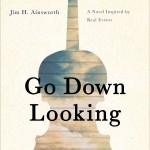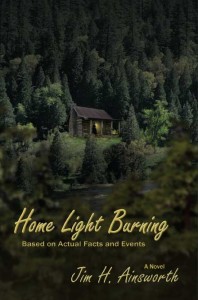 Today’s guest post is from Jim Ainsworth, an excellent writer and a true gentleman. He got into writing while he was working as an accountant. A publisher approached him and ask him to write a book on some phase of accounting. Jim did and it was successful. So, others followed. But you and I know it’s easy to gravitate to fiction, so Jim took up fiction writing and has produced some excellent books that are definitely worth looking at. But, here’s Jim’s take on the difficult task of a fiction writer.
Today’s guest post is from Jim Ainsworth, an excellent writer and a true gentleman. He got into writing while he was working as an accountant. A publisher approached him and ask him to write a book on some phase of accounting. Jim did and it was successful. So, others followed. But you and I know it’s easy to gravitate to fiction, so Jim took up fiction writing and has produced some excellent books that are definitely worth looking at. But, here’s Jim’s take on the difficult task of a fiction writer.
About six years ago, a small publisher offered me a contract to write a book on the perils and pitfalls of writing and publishing. He even offered a small advance. You writers out there know how rare that is. But I have not written the book yet because I still need a way to end it. When one reads a book about a problem, one expects a solution.
After almost fifteen years of writing novels, I still have not figured things out. And I am still a little surprised at the bias against fiction, especially non-genre, character-driven fiction.
I think that these are the six most difficult things for a writer of such novels to do:
Number six: Write a synopsis. Synopses used to be about 20 or 30 pages  for a 350 page book. Now, they are usually one or two pages. We must tell what our book is about in about 500 words or less. Try doing that when you are not writing plot-driven fiction. Try fleshing out five or more characters in a page or two without sounding silly.
for a 350 page book. Now, they are usually one or two pages. We must tell what our book is about in about 500 words or less. Try doing that when you are not writing plot-driven fiction. Try fleshing out five or more characters in a page or two without sounding silly.
Number five: Write a query letter. Make it engaging, yet professional, agents and publishers advise. List your background and qualifications, your book’s genre and word count, a synopsis of everything that happens in your manuscript from beginning to end, describe the target audience for your work (and no, all the readers in the world is not an acceptable answer),and by the way, keep it to one page, please. Also, if the margins are wrong, it will often be rejected out of hand. Then wait six months. In one case, I had a query answered four years after my book was published.
Number four: Write a logline. This is your elevator speech, just in case a very naïve agent catches you on an elevator and asks you what your novel is about. I expect somewhere in ancient times that actually happened, but nobody can prove it. In most of the big conferences I have attended, agents run for their rooms and lock themselves in just as soon as their presentation is finished.
Number three: Write copy for the cover of your book. See numbers four and six. One would think we could use those for cover copy, but they are never the exact number of words and four and six are written for agents and publishers. This one is for readers.
Number two: Get an agent or publisher to read any of the above. They look for blockbuster potential, and non-genre, character-driven novels seldom become blockbusters.
Number one: Market this type of book after it is published.
Yes, I know all the stories about unknown authors  who finally hit it big. J.K. Rowling and Harry Potter, Stephanie Meyer and the Twilight vampire series, E. L. James and the Shades of Grey erotica series (some call it mommy porn), John Grisham selling books out of his pickup in Wal-Mart parking lots.
who finally hit it big. J.K. Rowling and Harry Potter, Stephanie Meyer and the Twilight vampire series, E. L. James and the Shades of Grey erotica series (some call it mommy porn), John Grisham selling books out of his pickup in Wal-Mart parking lots.
Many first-time best sellers came about because of a fluke, a happenstance, a key contact, or a tremendous amount of money spent on a fine publicist. I don’t mean to imply that the best-sellers are not good books, only that there are many superior books that never sell a tenth as well (if at all).
So all I have to do is make myself the beneficiary of a fluke, create for my fifteen minutes of fame that will cause my books to skyrocket to the best seller lists. Stieg Larsson and his The Girl With the Dragon Tattoo, The Girl who Kicked the Hornets’ Nest, etc… made it big by dying. Scratch that.
And yes, I do believe in flukes. I enjoyed one big fluke and a few smaller one when I wrote non-fiction. So for now, I will just continue to work on finding the solution so I can write the last chapter of that book.
Jim Callan: If you disagree with JIm’s six tasks, or want to add another, please add your thoughts in a comment. Thanks. Find more about his books at:
http://jimainsworth.com/

I think publicizing your book is the toughest of all, but I also believe it’s difficult to keep your ideas fresh when writing a series.
Someone once asked me to write a short story. I couldn’t do it. Once I start writing, it’s difficult to stop. I guess that means I “talk too much”. Because of this, the things you mentioned are the most difficult part of the process for me, and many others. Maybe one day that “happenstance” you mentioned will step right up and smile at me.
Excellent post, and honest. Thank you!
A little luck never hurts. That’s good luck, of course. I’ve often said, what happens to the editor on her way into work may be more important than the synopsis.
I agree with everything Jim said…if you’re seeking to be published by a big house. However, in this day and time, I’m finding that time is better spent sending query letters to bloggers with a gazillion followers. It seems they are becoming the replacement for agents/publishers. They have the power to shoot an Indie author’s book to the top of Amazon’s Best Seller list within days. Once that happens, big houses come to you. Now, granted, not every self-pubbed author is going to hit it big doing that. But the chances are just as good or better, than doing all those steps and then having to wait months and months just to be rejected. Most bloggers usually require the blurb from the back of your book and a little info about the author.
As writers, we need to keep in mind that just because we get signed by a big house and receive an advance (the standard now days $5000) that doesn’t guarantee us any measure of success. Plus, because of that advance, we’ll only make about 35 cents each time we sell a book until that $5000 has been recouped by the publisher. We can all say that we’re not in for the money, but let’s be honest, it’d sure be nice to make some!
Bottom line, it’s a crap shoot anyway you go! But for me, my money is on the bloggers.
Still, starting out with 5,000 isn’t the worse thing that can happen. But I agree. One can make money going the indie route.
#1. Getting started. #2. Being satisfied with the start.
Walk away from it. After a while, look at it again. You’re likely to find it’s not half bad, and be excited to keep going.
Of course, sometimes I write something and think it’s pretty good. A week later, I’m saying — Did I write that? Terrible. What was I thinking.
All of the things you list are much harder than writing the book. And, one literary agent told me that your query letter will get 10 to 15 seconds of their time, so good luck with that.
I’ve heard the 15 seconds several times. And the first three chapters won’t be read unless the first page is great – not good – but great. Tough business. Thanks for the comment.
Hmm, selling books out of my car in a WalMart parking lot. Now, there’s an idea I hadn’t thought of. 🙂 But, seriously, promotion is difficult and can be extremely frustrating. Since you can’t please all of the people all of the time anyway, write what only you can write. I believe that, if you’re true to yourself, your books will find the right readers – hopefully, lots of them.
John Erickson started out self-publishing in his garage and selling his books out of his pickup. John hasn’t reached Grisham’s status, but I’d have to say he has done extremely well, winning Audie, Oppenheimer, Wrangler, and Lamplighter Awards, and having his books translated into Spanish, Danish, Farsi, and Chinese. Big publishers came after him. So, maybe we’re missing out on something. I’ve got a pickup. Maybe …
Well said, Jim. That number one is definitely the most time consuming for any writer who’d rather be writing! But the only way to find an audience is to hawk your books, and the personal touch is often needed. Maybe the end of your book is for the vast majority of authors to change their expectations? Instead of hitting it big, which the numbers show us are a minute percentage of authors in print, writers who have even a small audience who enjoy their books should feel accomplished that they have a readership, despite its size, of people who enjoy their books.
Well said, Marni. And I like to say, make sure your most important reader loves it. Who is that? Yourself.
That is my take on it. This from Jim Callan.